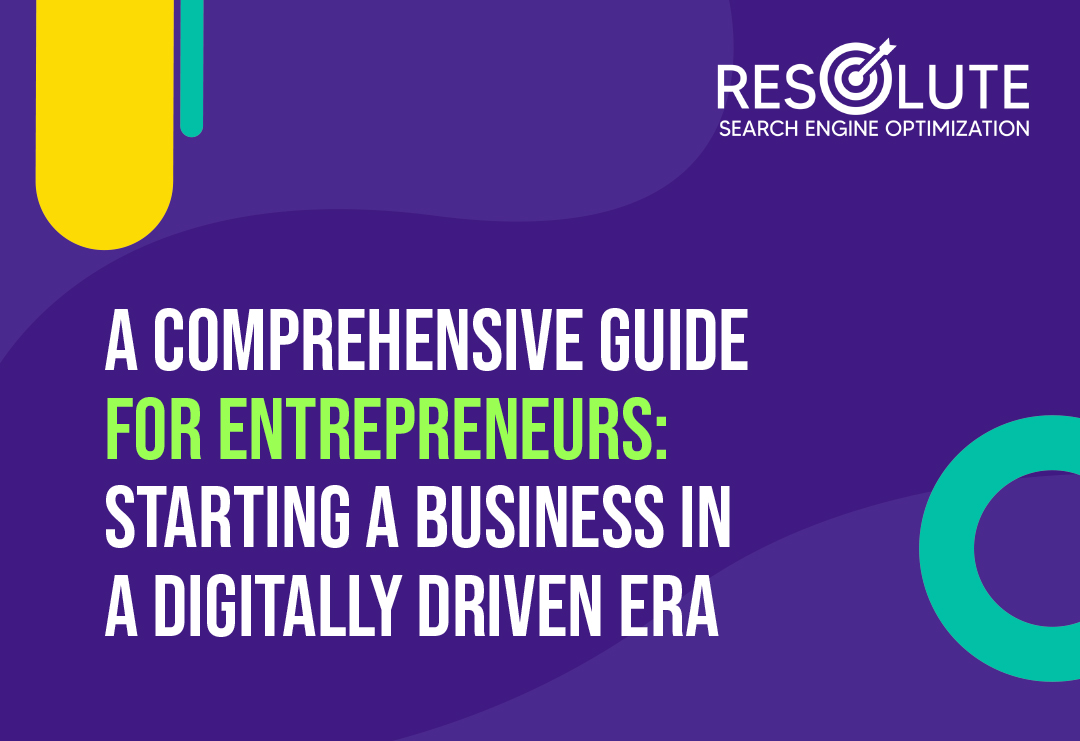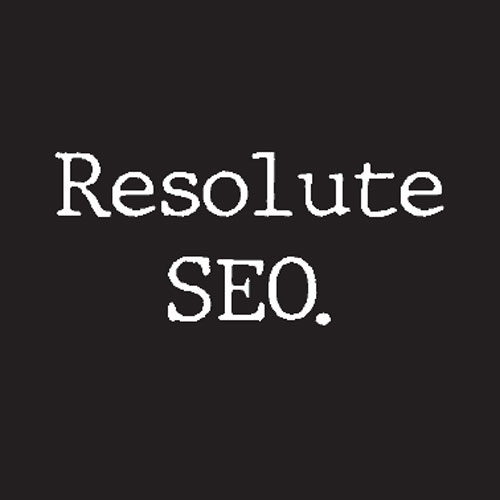A Comprehensive Guide for Entrepreneurs: Starting a Business in a Digitally Driven Era
The entrepreneurial spirit has never been more alive than it is today. Innovations in technology, a shift in consumer behavior, and the emergence of novel business models have made the prospect of starting a business more exciting and achievable than ever before. Here at Resolute SEO, we’re more than just a team of SEO experts. We are your trusted allies in this entrepreneurial journey, eager to provide the guidance you need to navigate the challenging terrain of setting up a business. We’ve assembled this comprehensive guide to help budding entrepreneurs get started on their entrepreneurial path.
I. Business Idea Generation
Every business journey starts with a seed of an idea. Idea generation is the process of brainstorming and developing a business concept that is both unique and viable. It’s essential to foster a creative environment that encourages innovative thinking.
- Identify a Need: Look around you, listen to people, identify problems and consider how you could provide a solution.
- Leverage Your Skills: Draw from your own skills and expertise. It’s often easier to build a business around something you are familiar with.
- Seek Inspiration: Learn from successful entrepreneurs. Their stories can often spark your own ideas.
II. Market Research and Analysis
Once you’ve landed on a promising business idea, it’s time to conduct market research. Understanding your market will not only validate the viability of your idea but will also help you to identify your target audience, understand their needs, and spot potential competitors.
- Primary Research: Get firsthand information from potential customers through surveys, interviews, or focus groups.
- Secondary Research: Gather existing data from industry reports, articles, and statistical databases.
- Competitor Analysis: Understand the competitive landscape to identify gaps in the market and strategies to differentiate your business.
III. Business Planning and Documentation
A well-crafted business plan acts as a roadmap to guide you through each stage of starting and managing your business. It should outline your business’ goals, the strategies to achieve them, your operational structure, and financial projections.
- Executive Summary: A high-level overview of your business, including the problem it solves and your unique selling proposition (USP).
- Market Analysis: An in-depth look at your target market and competition.
- Organization and Management: The structure of your business and the team that will run it.
- Marketing and Sales Strategy: How you plan to attract and retain customers.
- Financial Projections: A forecast of your business’ financial outlook for the next 3-5 years.
IV. Legal and Regulatory Compliance
Starting a business involves dealing with numerous legal requirements and regulations. Here’s what you need to do:
- Business Structure: Determine the legal structure of your business (e.g., sole proprietorship, partnership, corporation, LLC).
- Business Name: Register your business name with the appropriate government agency.
- Licenses and Permits: Obtain necessary licenses and permits as per local, state, or federal laws.
- Tax IDs: Apply for an Employer Identification Number (EIN) from the IRS.
Remember, it’s always a good idea to consult with a lawyer to ensure all legalities are covered.
V. Setting Up Operations
Now comes the exciting part – bringing your business to life! Here’s what you need to consider:
- Physical Location: Decide if you’ll run your business from home, a coworking space, or a dedicated office.
- Technology: Set up necessary technology including computers, software, and networking systems.
- Suppliers and Vendors: Build relationships with suppliers for any goods you’ll need for operations.
- Hiring: Start recruiting your team if your business calls for it.
- Website and SEO: This is crucial in today’s digital age. Your website is your online storefront. To ensure it’s visible to your target audience, partner with an SEO agency like Resolute SEO to optimize your website and increase its visibility on search engines.
Starting a business is a challenging endeavor filled with numerous decisions, legalities, and planning. However, with the right information, preparation, and resilience, your entrepreneurial journey can be a successful and rewarding one. Resolute SEO is here to accompany you in this journey, helping you build your digital presence and connecting you with your ideal customers. Together, let’s transform your business idea into a successful reality.
20 questions and answers related to starting a business in a digitally driven era:
Q: How can entrepreneurs foster a creative environment that encourages innovative thinking?
A: Entrepreneurs can foster creativity by creating open communication channels, encouraging idea sharing, providing opportunities for brainstorming sessions, and promoting a culture that embraces experimentation and risk-taking.
Q: What are some effective ways to validate the viability of a business idea?
A: Effective ways to validate a business idea include conducting market research, seeking feedback from potential customers, conducting feasibility studies, and testing the concept through prototypes or minimum viable products (MVPs).
Q: How can entrepreneurs identify gaps in the market to differentiate their business?
A: Entrepreneurs can identify gaps in the market by conducting thorough competitor analysis, analyzing customer needs and preferences, and seeking opportunities to provide unique solutions or value propositions that competitors may not offer.
Q: What are the key components that should be included in a well-crafted business plan?
A: A well-crafted business plan should include an executive summary, market analysis, organization and management structure, marketing and sales strategies, and financial projections for the next 3-5 years.
Q: What legal and regulatory requirements should entrepreneurs be aware of when starting a business?
A: Legal and regulatory requirements may include determining the appropriate business structure, registering the business name, obtaining necessary licenses and permits, and applying for tax identification numbers.
Q: How can entrepreneurs determine the best physical location for their business?
A: Determining the best physical location involves considering factors such as target market proximity, accessibility, competition, cost, and infrastructure. Market research and analysis can help entrepreneurs make informed decisions.
Q: How important is having an online presence and website for a business in the digital age?
A: Having an online presence and website is crucial in the digital age as it serves as a 24/7 storefront and a platform to connect with customers. It allows businesses to reach a wider audience, build credibility, and showcase products or services.
Q: What are the key elements of an effective website in terms of user experience and search engine visibility?
A: An effective website should have a user-friendly interface, fast loading speed, clear navigation, responsive design for mobile devices, high-quality content, optimized meta tags, relevant keywords, and a strong call-to-action.
Q: How can entrepreneurs build relationships with suppliers and vendors?
A: Entrepreneurs can build relationships with suppliers and vendors by conducting thorough research, establishing clear communication channels, negotiating mutually beneficial agreements, and maintaining open and honest partnerships.
Q: What are some effective strategies for attracting and retaining customers?
A: Strategies include identifying target audience preferences, developing a compelling value proposition, implementing effective marketing and sales strategies, delivering exceptional customer service, and creating customer loyalty programs.
Q: How can entrepreneurs stay updated with the latest trends and technologies in their industry?
A: Entrepreneurs can stay updated by attending industry conferences and events, joining professional associations, subscribing to industry publications and newsletters, following thought leaders on social media, and actively networking within their industry.
Q: What are some potential funding options for entrepreneurs starting a business?
A: Funding options may include personal savings, loans from financial institutions, angel investors, venture capital funding, crowdfunding platforms, or government grants and programs.
Q: How can entrepreneurs effectively manage their time and prioritize tasks?
A: Effective time management involves setting clear goals, creating to-do lists, utilizing productivity tools and techniques, delegating tasks, and maintaining a focus on high-priority activities.
Q: What are some potential challenges entrepreneurs may face when starting a business, and how can they overcome them?
A: Challenges may include financial constraints, competition, market saturation, lack of experience, and uncertainty. Overcoming them requires thorough planning, seeking mentorship or guidance, adapting to market feedback, and maintaining a resilient mindset.
Q: What role does networking and building professional relationships play in the success of a startup?
A: Networking and building professional relationships are essential for gaining industry insights, accessing resources and partnerships, obtaining mentorship or guidance, and creating business opportunities.
Q: How can entrepreneurs effectively leverage social media platforms to promote their business?
A: Entrepreneurs can leverage social media by creating engaging content, targeting the right audience, utilizing social media advertising, engaging in conversations and discussions, and analyzing social media analytics to refine their strategies.
Q: What are some effective ways for entrepreneurs to continuously learn and develop their skills?
A: Continuous learning can be achieved through attending workshops or seminars, taking online courses, reading industry-related books or articles, participating in industry forums or communities, and seeking feedback from mentors or industry experts.
Q: How can entrepreneurs effectively manage their finances and ensure financial stability?
A: Entrepreneurs can manage their finances by maintaining accurate financial records, creating a budget, monitoring cash flow, seeking professional advice from accountants or financial advisors, and regularly reviewing and adjusting financial strategies.
Q: How can entrepreneurs maintain motivation and resilience during the challenges of starting a business?
A: Maintaining motivation and resilience involves setting realistic expectations, celebrating small wins, seeking support from mentors or a business community, maintaining a healthy work-life balance, and reminding oneself of the passion and purpose behind the business.
Q: What resources or support can entrepreneurs seek to assist them in starting a business in the digitally driven era?
A: Entrepreneurs can seek resources and support from business incubators, accelerators, industry-specific associations, mentorship programs, entrepreneurial networks, and professional service providers such as Resolute SEO.
By considering these additional questions and answers, entrepreneurs can gain further insights and guidance when starting a business in the digitally driven era. Resolute SEO remains dedicated to providing valuable assistance and support to entrepreneurs, helping them navigate the challenges and complexities of starting and growing a successful business.





